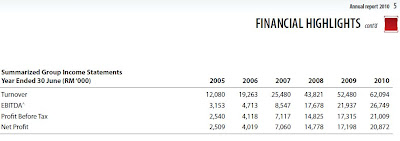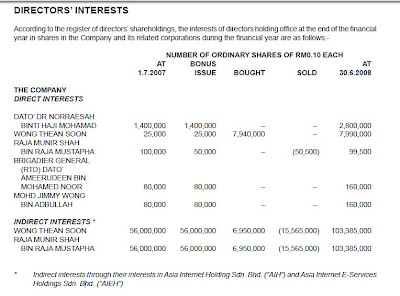According to Malaysia123.com
MyEG Services Berhad is a concessionaire for the Malaysian E-Government MSC Flagship Application. MyEG role as a Service Provider for the E-Services component essentially provides the electronic link between the Government and citizens/businesses
Through MyEG portal, MyEG offer the Malaysian public a single point of contact between the Government and the people it serves. MyEG portal enables Malaysians to dynamically interact with numerous agencies within the Federal, State and the Local Government machinery providing services ranging from information searches to licence applications.

Turnover and profits are on increasing trend for this listed company:

Effectively MyEG is
Best Bloated Civil Service
With 1.3 million civil servants to a population of 26 million, Malaysia has one of the highest civil servants-to-population ratio in the world by the Organisation for Economic Cooperation and Development standards.
In 2009, Malaysia’s civil servants-to-population ratio was highest in Asia Pacific. Her ratio was 4.68%, compared to Indonesia’s 1.79%, Korea’s 1.85% and Thailand’s 2.06% all of which have less than half our ratio.
In 2009, Singapore had a total of 60,000 civil servants, i.e., 1.5% of the total population. Hong Kong had 160,000 out of a population of 7 million (2.3%). Taiwan(population of 23 million) was served by only 528,000 (2.3%).

So the question is, are Malaysians paying double? Are we still paying for excessive number of civil servants while some of their jobs have been outsourced?
In addition, what kind of clause, terms and conditions did the Barisan Nasional administration bound the rakyat into? As tax payers' surely we have the rights to know. The audited accounts of MyEg merely included the statement:
 We can't tell how we are being charged by MyEG, can we? Besides, were there open tenders called to ensure Malaysians got the best deal? Why MyEG was chosen? What are the safety procedures in place to ensure our private and confidential information submitted is not being abused?
We can't tell how we are being charged by MyEG, can we? Besides, were there open tenders called to ensure Malaysians got the best deal? Why MyEG was chosen? What are the safety procedures in place to ensure our private and confidential information submitted is not being abused? Why can't the Performance Now administration come up with an inter-ministry/department team to handle this collection function across the administration without a profit element ?(MyEG as a plc needs to generate dividends to its shareholders and guess who is paying for the dividends, plus note 32 of the accounts shows that annually the plc pays about RM200K for rental and professional services to Embunaz Ventures Sdn. Bhd, a company owned by its Executive Chairperson, Dato’ Dr Norraesah Binti Haji Mohamad, "has a substantial financial interest" )
MyEG, to me, seems like another civil service that should be provided to tax payers at no additional cost - i.e. without profit, related party transactions and dividends. Sure theoretically, private enterprise are more efficient than public sector because of the profit motive but I have dealt with Hong Kong and Singapore immigration and income tax departments to know that with the right work attitude and culture, public service can be very very efficient and impressive.
While tax payers in private sector have to deal with risk of business downturn, pay-cuts, voluntary separation schemes, retrenchment, unfair/wrongful dismissals and other threats to our livelihood, majority of civil servants enjoy an iron rice bowl, pension (which offset the disadvantage of lower pay), immunity from disciplinary action (ask Siti Inshah and those BTN indoctrinators), pressure-less environment (unless you are in public schools), no performance yardstick (try calling an ambulance from public hospitals and see what happens) and whatever whatever. Yeah sure, working in public sector has it disadvantages too but certainly not as stressful as those in risk-taking private sector.
Disclosure requirements that listed companies must follow, according to accounting standards, company law and Bursa listing requirements, are suppose to give more relevant information for investing public to understand the company they have or thinking of investing in.
According to the annual reports and accounts, the annual pay package of the executive directors is about RM312,000 per year. So with an "s", presumably there is more than 1 executive director hence the RM300K was supposed to be shared out.
 Raja Munir Shah and Wong Thean Soon are designated as Executive Director and Managing Directors respectively in the annual reports so my mind boggles how 2 person can be deemed to control 56 million shares in the company that pays between them, probably around RM300K a year? Most intriguing.
Raja Munir Shah and Wong Thean Soon are designated as Executive Director and Managing Directors respectively in the annual reports so my mind boggles how 2 person can be deemed to control 56 million shares in the company that pays between them, probably around RM300K a year? Most intriguing.
The profile of Raja Munir Shah included the following:
In 1997, he was elected to head the Tanjong UMNO Youth Division and subsequently appointed as the State UMNO Youth Information Chief until his tenure ended in 2004. He was appointed as a City Councilor in 1997, 1998, 2003 and 2004. During his tenure as a Councilor in Penang Island Municipal Council (“MPPP”), he served as Chairman and Committee Member in various standing committees overseeing legislatives and policy matters within the jurisdiction of MPPP which covers the island of Penang.
I have to put my hands up in awe.
But the biggest shock is still to come....
http://sahamas.net/forum80/13150.html
Under the customs tax monitoring scheme, MyEG has a 40% stake in a special purpose vehicle (SPV) that will link up point-of-sales (POS) terminals of businesses that are subject to customs’ service taxes, such as restaurants and entertainment outlets.
The SPV will spend RM100 million on capex, but will receive a 20% share of the taxes that were previously found to be under-declared, with the lion’s share of 80% going to the government.
This will give MyEG a potentially large wildcard from FY June 2013 onwards. However, it is too preliminary to assess at this juncture, as much depends on how much tax was under-declared in the first place. The service will also be compatible with a GST regime that is likely to be implemented at a later stage, giving the company a potentially wider earnings base.
What kind of irresponsible government would
1) let a private sector to help them chase after tax evaders - do you see IRB employing debt collectors? If the custom authorities have an act to enforce, they should just enforce it without additional expebse!
2) let a plc to gobble up to 20% of public's money? these money could be used for welfare, education, healthcare, public utilities etc instead of dividends, private profits etc.
And this path to money printing encompass service, sales taxes and in future, after getting re-elected, GST. The magnitude of benefit coming to MyEG's way, at public's expense, is presently incalculable.















